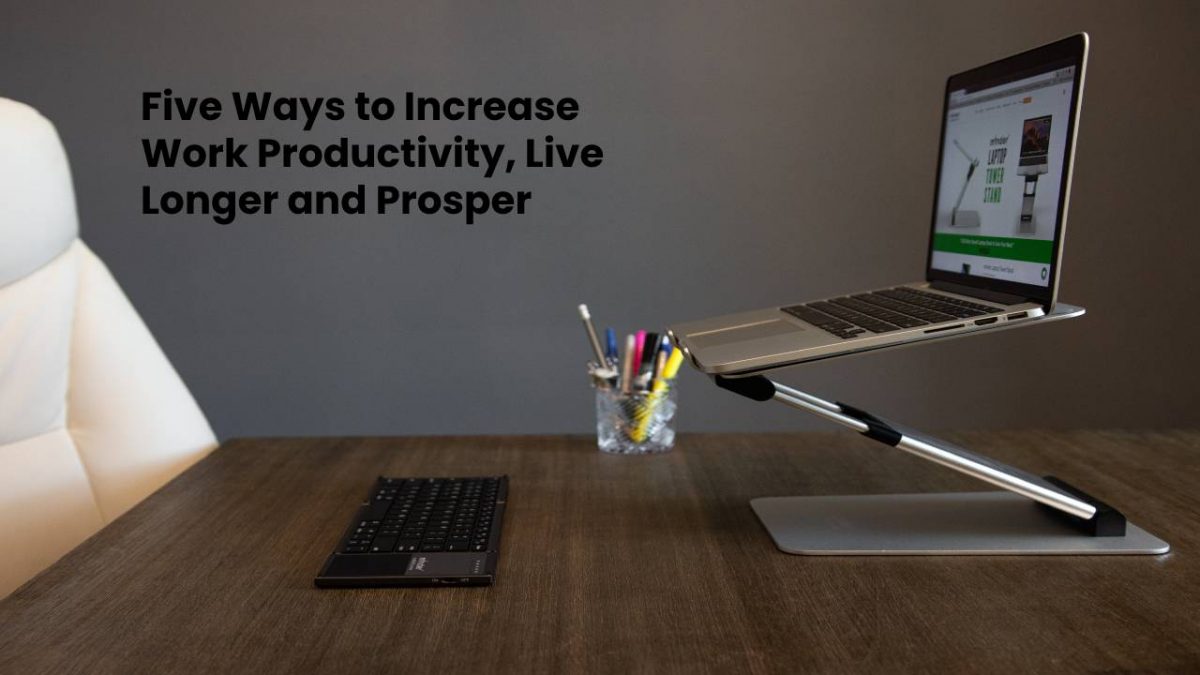Five Ways to Increase Work Productivity
By Susan Howard, MS, NBH-WC, obVus Solutions
Many small business owners find themselves seeking the solution to a healthy work-life balance.
From entrepreneurs to CEOs, success often comes after extended work days, long hours of being tied to a desk and far too much screen-time.
Unfortunately, these success-driven work habits can have adverse effects on both physical and mental well-being.
A landmark study from the World Health Organization estimated that long work hours (55 hours or more per week) can have a significant impact on health including stress, poor work-life balance, and health risks.
It lead to tiredness, fatigue and poor concentration.
Even more impactful, long work hours are also associated with mental depression, according to a recent study.
There is a direct established correlation to work habits and our well-being.
Today in the US, some 122 million Americans suffer from one or more chronic health conditions that decrease the quality of life.
Many people need help understanding a physician’s advice, assistance implementing recommended treatment, and follow-through support when it comes to incorporating medical advice.
Table of Contents
Have you noticed habits are difficult to change without support?
Proven as an effective tool in many studies, certified health coaches are helping close the gap by working one-on-one with clients to coach and condition healthy work habits, reverse strain and prevent injury before they occur.
Health coaching is effective because it puts the client in the driver’s seat and works collaboratively toward successful outcomes: meeting a client where they are, holding them in the highest regard, identifying health goals, creating a path to build self-management and motivation, and improving overall quality of life.
Five Wellness Tips to Practice Daily
As a certified health coach, in my practice I work with many business owners and tech professionals who are faced with troublesome to debilitating strain and injury due to their current work habits.
Looking through the lens of what may support you, here are the top five wellness best practices I recommend:
-
Incorporate mini-breaks throughout your day.
Sitting too long can reduce energy, limit blood flow, and tighten muscles, leading to sore necks and backs; while too many hours of screen time can lead to fatigue and dry eyes.
- Incorporate small mini-breaks regularly throughout the day – I call them “ME/mos” or “me moments” – to get you up and moving. These “ME/mos” can be anything from walking your dog, watering your plants, filling a glass of water, and even a 5-minute meditation or yoga stretch.
- I incorporate a smart wearable called minder which allows me to customize my “ME/mos” and prompts me to move regularly.
-
Set your computer monitor at screen level and set your mind and body up for success.
The optimization of ergonomics is key. Laptop screens that don’t meet eye level may create unnecessary stress and potential harm to the kinetic chain.
Consider this: at a 15-degree bend, the weight of the head that the neck supports doubles from about 12 pounds to 27 pounds; and a 30-degree bend increases the weight up to 40 pounds.
The equivalent of a small sack of potatoes. Adjustable laptop stands allow for correct eye-level positioning of screens, so the neck can remain stacked straight while minimizing eye strain.
And optimize the positioning of an external keyboard and mouse to support arms and wrists.
-
Consider an ergonomic keyboard for optimal hand and wrist support.
Standard keyboards don’t position your hands or wrists correctly which leads to strain and reduces functionality.
Instead, upgrade to an ergonomic keyboard which can reduce the impact of repetitive motion.
Keep the keyboard directly in front of you while maintaining healthy posture, with shoulders relaxed and elbows close to the body. Wrists should be straight and in line with your forearms.
-
Practice good posture and mindful breathing.
On an average day, many of us spend 10 hours or more working on a computer. That places excessive stress on certain muscles, creating imbalance.
Under constant stress, these muscles cause strain on the shoulder joints, which translates into pain around the neck and upper back.
Find a fitness practice to help build a strong core (yoga is terrific), which is essential to good posture, and especially important for those of us who sit for hours on end.
And just 10 minutes of mindful breathing a day can help relieve anxiety and stress, improve blood pressure, support no-drinking resolutions, build lung health and increase longevity.
My minder wearable not only reminds me to breathe, but also offers several breathing exercises to try, such as Box Breathing and diaphragmatic breathing.
-
Work with a Nationally-Board Certified Health and Wellness Coach.
Working with a health coach is scientifically proven to change health outcomes.
When choosing a health coach, it’s critical that they have the right qualifications and training.
The National Board Certification credential (NBH-WC), offered in collaboration with the National Board of Medical Examiners, represents the profession’s highest standard and is based on extensive research and the training, education, and assessment of coaches who attended an NBHWC-approved school that meets specific criteria and standards.
In closing, remember to go easy on you. Good health habits take time to build and small successful steps lead to big wins. Start by identifying new health practices that you can maintain over the long-term and integrate into your day.
Smart wellness wearable tools, like the minder app can help set new health habits into motion by using real-time visual biofeedback to coach and condition new health habits, from good posture to mindful breaks.
Soon, good health habits will become an integral part of your daily routine.
Author Bio

Susan Howard holds a Masters of Kinesiology-Integrative Wellness from Point Loma Nazarene University and is a Nationally Board-Certified Coach with the National Board for Health and Wellness Coaching (NBC-HWC) which collaborates with the National Board of Medical Examiners to provide a robust board certification examination.
The esteemed NBH-WC credential represents training, education and assessment standards allowing for the profession to advance in all aspects of healthcare and wellness.
As Master Coach at tech wellness company obVus Solutions, Susan leads the implementation of a collaborative platform between clients and certified health coaches, offering a proven scientific approach to well-being.
With more than 25 years experience in the industry, Susan supports business leaders and entrepreneurs in optimizing their lives in all aspects of wellness to help elevate quality of life, going beyond the physical to support the creation of a joyful, passionate, purposeful life.
To learn more, visit www.obvus.me and follow on Facebook, Instagram and on Twitter.

